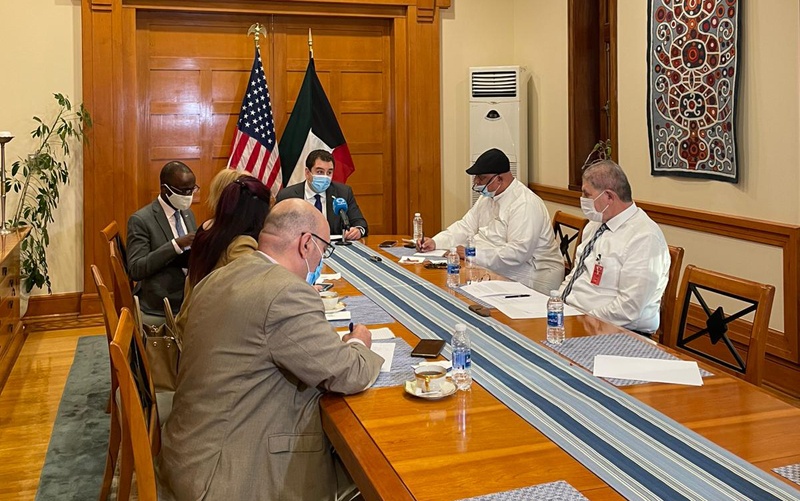 KUWAIT: Deputy Assistant Secretary of State for Arabian Peninsula Affairs in the Near East Bureau at the US Department of State Daniel Benaim holds a roundtable discussion at the US Embassy yesterday.
KUWAIT: Deputy Assistant Secretary of State for Arabian Peninsula Affairs in the Near East Bureau at the US Department of State Daniel Benaim holds a roundtable discussion at the US Embassy yesterday.By Abdellatif Sharaa
KUWAIT: A visiting US official yesterday expressed gratitude to HH the Amir Sheikh Nawaf Al-Ahmad Al-Jaber Al-Sabah for his "excellent decision to work closely with the United States to partner in the evacuations from Afghanistan". "US Secretary of State Antony Blinken's visit to Kuwait showed how important we believe this US-Kuwait relationship is. Throughout history, US and Kuwait have proven that they are the strongest of allies and friends," said Daniel Benaim, Deputy Assistant Secretary of State for Arabian Peninsula Affairs in the Near East Bureau at the US Department of State.
"I wanted to meet government, civil society and business leaders to discuss many issues of importance that play into our strategic dialogue, and get a firsthand sense of key bilateral and regional issues that we have a chance to advance together," Benaim said during a roundtable discussion at the US Embassy yesterday. He praised Kuwait's diplomatic role in restoring the spirit of Gulf unity, "which was on display when the countries came together in New York and met the US as full partners, having put to rest the rift that had divided the US allies".
Benaim said discussions with Kuwaiti officials included policies related to Iran, Iraq and Syria. Benaim earlier yesterday met Kuwait's Deputy Foreign Minister Majdi Al-Dhafiri, who previously served as Kuwait's ambassador to Iran. "President Biden has been committed to ensure Iran does not acquire a nuclear weapon. We will consult closely with our partners and work with the international community to return to the nuclear deal (known formally as the JCPOA), to bring Iran's nuclear program back from the dangerous levels of enrichment it is currently engaged in," he said.
"Secretary Blinken has made it clear that the window of diplomacy is open, but it won't be open forever. We hope the new Iranian government will take the earliest opportunity to return to the table and engage in very serious diplomacy to address this threat to international security," Benaim added, refusing to be drawn when asked if the Biden administration would be prepared to pursue "other avenues" to ensure Tehran does not acquire a nuclear weapon.
Benaim vehemently denied that the US has lost interest in the Middle East. "The US has enduring interests, enduring values and enduring commitments in this region. I think the last two months have very vividly demonstrated that this region is fundamental to how America operates around the world, as we saw with the evacuation from Afghanistan. We will be here in the Middle East because it is the best way to advance our national interests, when countries are not able to proliferate nuclear weapons and terrorism is held in check. This can happen when partnerships are vibrant and healthy," he said.
Benaim was asked if the US will hand over the names of Kuwaiti members of Hezbollah to the Kuwaiti government. "Kuwait is a very good partner of the US on counterterrorism, and these kinds of sanctions help us ensure that Iran and its proxies and organizations cannot undermine the norms of international security and engage in terrorist behavior," Benaim replied, referring to US Treasury Department sanctions imposed on two Kuwaitis last month for supporting and financing Hezbollah.










